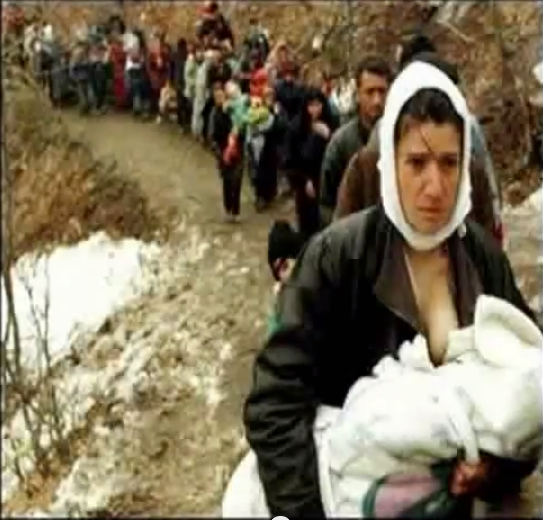New York, May 14, 2014
The petition of French intellectuals, original text distributed in Paris, June 1998.
“The Current Situation in Kosovo
Serbian police, army, and paramilitary units continue to wage war on ethnic Albanian citizens of Kosovo. Entire villages are laid waste by artillery and air assault. A Serbian blockade prevents food and medical supplies from reaching the population of endangered regions, with a consequent risk of famine. Ethnic Albanians are being systematically “cleansed” from villages in western Kosovo, their houses shelled and set on fire. Over 50000 people have fled their homes. The destruction of homes and villages, massacres, arbitrary arrests, and state-sponsored terrorism with the apparent goal of “ethnic cleansing” is a repeat of the pattern in Bosnia in 1992-1995.
The International Community and its Responsibilities
In such circumstances, how can “talks” be meaningful? The precondition for serious negotiations can only be an end to the human rights violations and the withdrawal of all Belgrade’s repressive forces.
International troops placed on the borders between Kosovo and Albania, or between Kosovo and Macedonia, to “contain” the conflict would only increase the suffering of the Kosovo Albanians, by preventing refugees from fleeing to safety and by preventing arms from reaching Albanian fighters.
Do we really want “peace” at the price of genocide?
If the repression continues, international military intervention within Kosovo itself should be considered. Such intervention should not be falsely “neutral” — it should have a clear mandate to protect the civilian population, using force if necessary.
But it is essential that any military intervention should also have the clear political goal of a just solution to the Kosovo problem. This means that the international community should reconsider its opposition to Kosovo’s independence. Mere autonomy for Kosovo (as under the 1974 constitution) is no longer possible. The present Federal Republic of Yugoslavia is not the former Yugoslavia — which Milosevic destroyed precisely through a forcible assault on the autonomies of its constituent parts, including Kosovo. Serbia can never be democratic as long as it holds Kosovo by force.
The truth is that Serbia has no legitimate claim to Kosovo, which it annexed by force in 1912 — and never in fact legally incorporated. The post-1945 Yugoslav Federation of which Kosovo was indeed a constituent part no longer exists. Under its last (1974) constitution, Kosovo was part of the Federation on an effectively equal footing with the other units (six republics and two provinces in all). No interference in Kosovo’s internal affairs, nor any change of its borders or status, was legally permissible without its own freely-given consent. Serbia’s suspension of Kosova’s autonomy in 1989 was not simply forcible (the province was placed under siege, its assembly was ringed with tanks and overflowed by MiG jets), it was also illegal — i.e., contrary to the existing constitutions of Serbia, Kosovo, and Yugoslavia. Kosovo’s subsequent declaration of independence, a reaction to this illegal act of annexation, was taken by its legally elected assembly and validated by a popular referendum. Therefore, Kosovo’s claim to independence rests on far stronger ground than any Serbian claim to Kosovo.
The European Parliament, in 1990, condemned the illegal suppression of Kosovo’s autonomy. In 1991, moreover, it passed a resolution recognizing the right to self-determination of the eight constitutive units of the former Yugoslavia. In 1992, the Badinter Commission presided over the dissolution of the former Yugoslavia into its “constituent units”. The international community chose (purely pragmatically) to consider these units to be the six Republics. However, it could equally well (and should) have chosen to include the two autonomous provinces of Kosovo and Vojvodina, since each had its own constitution, governmental institutions, and even its own Territorial Defence force. (It should be stressed that the dissolution of a federal state into its components, as took place with the former Yugoslavia, is not the same as the secession of regions from a still-existing state. So recognizing Kosovo’s right to independence would not set any precedent for the secession of other regions of existing Balkanic states.)
Once the current repression has been halted, negotiations must take place within a framework in which justice, democracy, legality, and human rights are the underlying principles, not sheer power. The international community should use its influence to ensure such a framework and should act as a guarantor of any settlement. Otherwise, discussions risk being merely a cover for the extension of violence and “ethnic cleansing”.
First signatures:
Marie-Françoise ALLAIN, Klara BUDA, Bashkim BYTYQI, Jean-Yves CARLEN, Alic CHERKI, Catherine COQUIO, Marie-Christine DAVY, Alice C. DEPRET, Faik DIZDAREVIC, Steve DUCHENE, Fati CASET, Antoine GARAPON, Paul GARDE, Laurence HANSEN-LOVE, Musa JUPOLLI, Dr. Veton KEPUSKA, Muhamedin KULLASHI, Charles de LESPINAY, Branka MAGAS, Fares NABILE, Véronique NAHOUM-GRAPPE, Boris NAJMAN, Hélène PIRALIAN, Dr. Danica RAMLJAK, Elinore SCHAFFER, Sedak SELLAM, Taleha TALAHITE, Jay TAYLOR, Enzo TRAVERSO, Laura TROMBLEY, Julie WORNAN
Contact:
Committee Kosovo, Esprit, 212 rue St-Martin, 75003 Paris
Fax : 01 42 33 45 93 or 04 75 22 27 80
email: ju…@prointegra.fr”
Text original published in Paris on June 23, 1998, as a petition, which was signed by a number of famous French intellectuals. It contains the mistakes of the original text, written in English very fast and distributed overnight to the members of the Kosovo Committee* in Paris.
Here is a link to the petition that Marie-Françoise Allain and Klara Buda initiated.
https://groups.google.com/forum/#!topic/bit.listserv.albanian/f5oegh9gFhE
” The petition was my suggestion, Marie-Françoise Allain was very enthusiastic and helped to perfect the text in English. In 1999, during my period of work as a journalist at Radio France Internationale, and despite my professionalism, this text was often used to accuse me of bias, as an activist on the Kosovo issue.” Klara Buda



